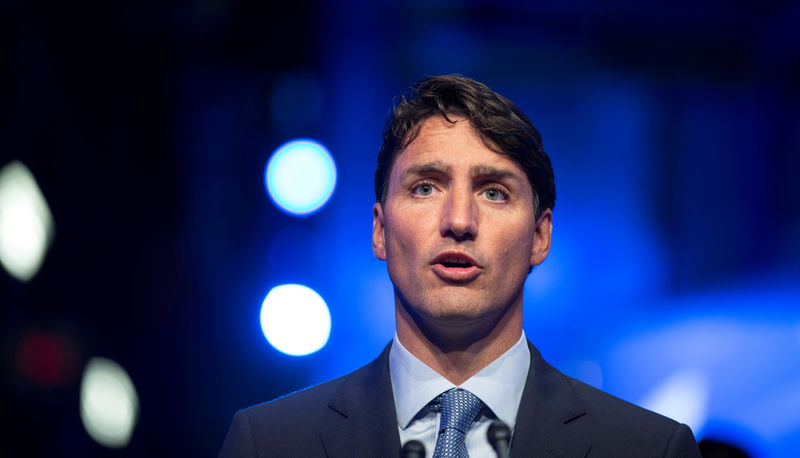 © Reuters. FILE PHOTO: Canada’s Prime Minister Justin Trudeau answers questions from the media in Montreal Quebec
© Reuters. FILE PHOTO: Canada’s Prime Minister Justin Trudeau answers questions from the media in Montreal QuebecBy David Ljunggren
OTTAWA (Reuters) – Concerned business and political leaders are increasing the pressure on Canadian Prime Minister Justin Trudeau to agree on a deal to renew NAFTA and drop his insistence that no deal is better than a bad deal.
Foreign Minister Chrystia Freeland will hold fresh talks on the North American Free Trade Agreement with U.S. Trade Representative Robert Lighthizer in Washington on Wednesday as a U.S.-imposed deadline of Oct. 1 looms.
The two sides are far apart in some areas and Trudeau says his Liberal government will walk away if necessary.
Signs are growing that hitherto solid domestic support for Ottawa’s stance is starting to fray amid fears of the potential economic damage. The United States takes 75 percent of Canada’s exports and President Donald Trump is threatening to impose tariffs on autos.
Freeland defended Ottawa’s stance on Tuesday, telling reporters “any negotiator who goes into a negotiation believing that he or she must get a deal at any price … (will) be forced to pay the maximum price for that deal.”
That approach though is starting to worry some.
“The problem with the bold statement that ‘No deal is better than a bad deal’ is that a bad deal is very much in the eye of the beholder,” said John Manley, a former Liberal finance minister who heads the Business Council of Canada, which groups many chief executives.
“Anyone who thought … we were going to get something better than what we had under NAFTA 1.0 was delusional. We knew that this was all about taking some things away,” Manley said in a phone interview on Tuesday.
Trump came to power last year threatening to tear up NAFTA unless major changes were made to a pact he blames for the loss of manufacturing jobs.
Last month he announced a side deal with Mexico and made clear he was prepared to exclude Canada if necessary.
Doug Ford, the premier of Ontario – Canada’s most populous province and center of the auto industry – will meet Canadian negotiators on Wednesday to express his concerns.
“You’re all hearing the rumors that we are hearing, that maybe they don’t want a deal. So we’re going down there to say that ‘You bloody well need to get a deal’,” Ontario trade minister Jim Wilson said on Monday, adding that a million Ontario jobs rely directly on NAFTA.
Trudeau’s Liberals have no chance of winning a federal election set for October 2019 unless they do well in Ontario.
In the western province of Saskatchewan, premier Scott Moe also expressed concern about walking away from the talks.
“We cannot move forward with a bad deal, I’m not certain we can move forward with no deal either,” he said last Thursday.
Pressed on NAFTA, Trudeau told an interviewer on Monday that a decision point might be weeks away.
Canadian officials say they do not believe the U.S. Congress would ever back the idea of excluding Canada from NAFTA.
But Manley said his members were increasingly concerned that Trudeau’s team might be relying on Congress, which he termed “a very high risk strategy”.
U.S. Republican House Majority Whip Steve Scalise on Tuesday cited “a growing frustration with many in Congress” over Canadian negotiating tactics and suggested Canada could be left out of NAFTA.
In a separate Washington development, U.S. business leaders on Tuesday urged the administration to include Canada in any trade agreement with Mexico.
“It would be unacceptable to sideline Canada, our largest export market in the world,” the heads of the U.S. Chamber of Commerce, the Business Roundtable and the National Association of Manufacturers said in a letter to Lighthizer.
(The story corrects name of Ontario premier to Doug Ford from Rod Ford in paragraph 11.)
(With additional reporting by David Shepardson in Washington; Editing by Tom Brown)
Source: Investing.com




























